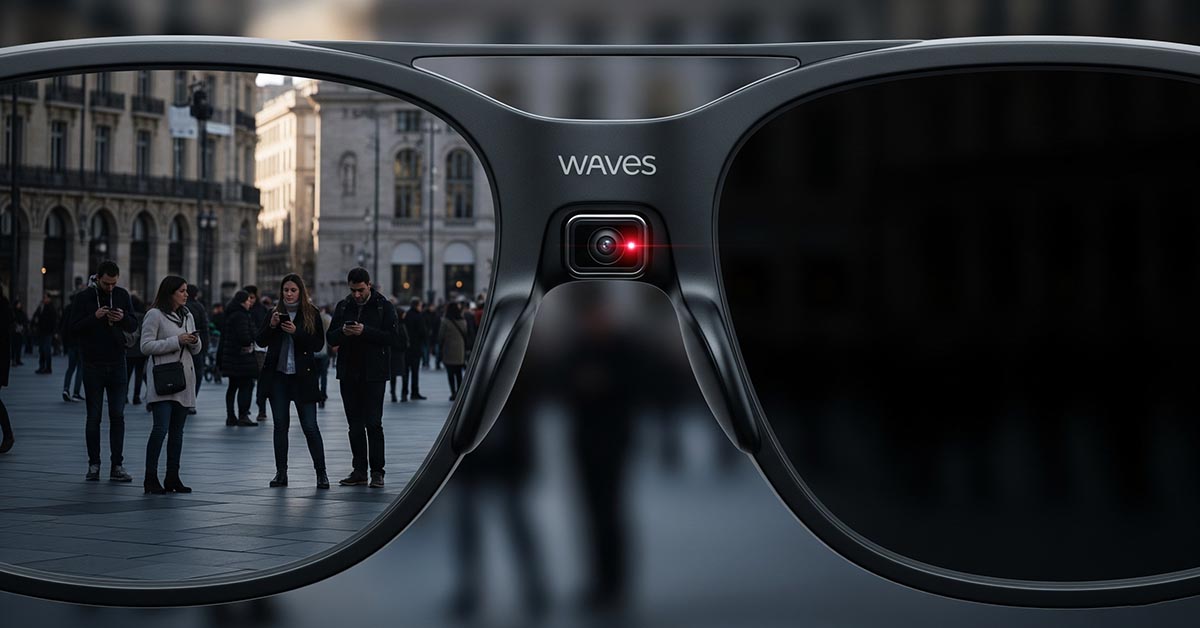A new gadget is making waves online, but not for the reasons its creators might have hoped. Waves camera glasses, a new wearable device aimed at content creators, is facing intense criticism for a feature that many believe encourages illegal activity by allowing users to record people in complete stealth. This design choice has reignited a fierce debate about the collision between wearable technology and personal privacy.
What Are Waves Glasses?
At first glance, Waves seem like a dream come true for streamers and storytellers. Marketed as “all-day camera glasses,” they are designed to let creators record, clip, and livestream their experiences effortlessly. The company, Symphonic, makes it clear that these are not “smart glasses” in the vein of Google Glass or Meta’s Ray-Bans. Instead, they are a dedicated, high-quality camera you can wear on your face, boasting a 12MP sensor, 3K recording, and the ability to stream live to platforms like Twitch and YouTube.
introducing Waves, camera glasses for creators.
record in stealth. livestream all day.
pre-order now. pic.twitter.com/mFyEiriAKx
— Chris Samra (@crsamra) July 23, 2025
However, it’s one specific feature that has landed the company in hot water. Unlike Meta’s Ray-Ban Stories, which have a hard-wired LED light that always turns on during recording to alert bystanders, Waves gives the user full control. According to the company’s own FAQ, “Waves will have an external indicator, but the user will be able to control whether or not it’s in use”. In short, the glasses have a “stealth mode,” and critics were quick to point out the dangerous implications.
Before making any purchase, it’s always wise to be informed. For more tips on what to look for, check out our guide on How to Choose a New Gadget: Buying Guide for 2025.
Walking into a Legal Minefield
Promoting the ability to record secretly is not just an ethical issue; it’s a legal one. In the United States, recording laws vary significantly by state. While many states operate under “one-party consent,” meaning you can legally record a conversation as long as you are part of it, about a dozen states have much stricter “two-party” or “all-party” consent laws.
According to legal resources like the Reporters Committee for Freedom of the Press, states like California, Florida, and Pennsylvania require that every person in a conversation consents to being recorded. Consequently, using Waves glasses to secretly film someone in these states could constitute a criminal offense. By making the recording light optional, critics argue that Waves is actively encouraging users to break these laws.
Have We Forgotten the “Glasshole”?
This isn’t the first time a tech company has stumbled over the issue of wearable camera privacy. A decade ago, the launch of Google Glass was met with a massive public backlash. The fear of being secretly recorded led to the device being banned in bars, movie theaters, and casinos. More importantly, it created a social stigma, coining the term “Glasshole” for anyone wearing the device in public. The project ultimately failed as a consumer product largely because Google failed to address these fundamental privacy concerns.
Meta learned this lesson the hard way and made the LED indicator on its Ray-Ban glasses a non-negotiable privacy feature. Waves, on the other hand, seems to be ignoring this history by marketing stealth recording as a feature, not a bug.
This legal patchwork highlights how different regions are handling new devices, a theme that is part of the bigger picture of Global Tech Trends 2025: A Regional Depth.
A Chilling Precedent for Privacy
Privacy advocates are sounding the alarm. Organizations like the Electronic Frontier Foundation (EFF) have long warned about the dangers of normalizing constant surveillance through wearable devices. When a camera is on someone’s face, it becomes nearly impossible for bystanders to know if they are being recorded, eroding the expectation of privacy in public spaces.
The ability to turn off the indicator light makes these glasses a potential tool for harassment, stalking, or capturing sensitive information without consent. While the technology is impressive, this single design choice could turn an innovative gadget for creators into a privacy nightmare for everyone else. As Waves prepares to launch, the company finds itself at the center of a debate it seems unprepared for: in the quest to capture everything, what happens to our right to be left alone?





